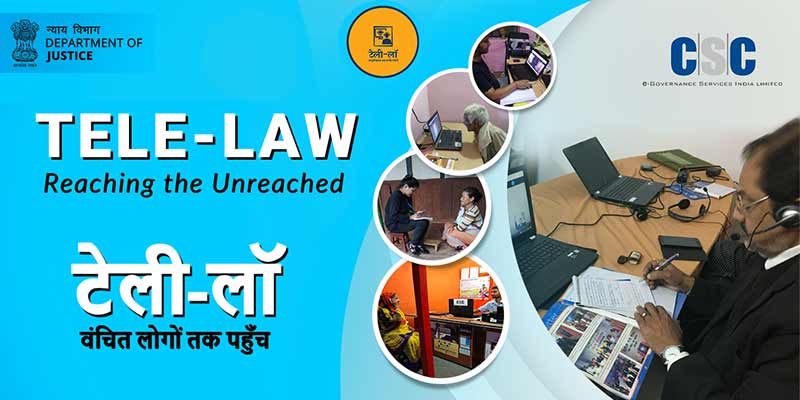- India
- May 31
Explainer - Tele-Law programme
The Tele-Law programe, under the ministry of law and justice, has achieved a new milestone with four million beneficiaries across the country having been empowered with pre-litigation advice.
Tele-Law leverages technology to connect the beneficiary with the lawyers in a panel to seek legal advice and consultation for early redressal of their grievance.
Tele-Law programme
• The department of justice partnered with the National Legal Services Authority (NALSA) and CSC e-Governance Service India Limited for mainstreaming legal aid to the marginalised communities through Common Services Centers (CSC).
• The Tele-Law scheme was launched on April 20, 2017.
• Tele-Law means the use of communications and information technology for the delivery of legal information and advice. This e-interaction between lawyers and people would be through the video-conferencing infrastructure available at the CSCs.
• The concept of Tele-Law is to facilitate delivery of legal advice through a panel of lawyers stationed at the state Legal Services Authorities (SALSA) and CSC.
• This service aims to reach out to the needy especially the marginalised and disadvantaged.
• Tele-Law initiative has made legal consultation both easily accessible and highly affordable for common citizens.
• Launched as a pilot programme with 1,800 CSCs in 11 states, the programme coverage has scaled up to one lakh CSCs covering 669 districts across 36 states/UTs in the country (as on May 31, 2022).
• The scheme will be extended to 2.5 lakh Gram Panchayats by the year 2026, adding 50,000 Gram Panchayats every year and to cover more than 90 lakh beneficiaries seeking pre-litigation legal advice.
How does it work?
• Tele-Law service enables anyone to seek legal advice without wasting time and money. The service is free for those who are eligible for free legal Aid as mentioned under Section 12 of Legal Services Authority Act, 1987. For all others a nominal fee of Rs 30 is charged.
• Para Legal Volunteer (PLV) is the first point of contact between rural citizens and lawyers providing legal aid through CSC. They are not lawyers, but have basic understanding of legal process. They hear the grievances of citizens and offer appropriate support/suggestions for legal aid. They also help the citizens understand legal issues and advice given by lawyers.
• It connects people to panel of lawyers via video conferencing/telephone facilities available at CSCs situated at the village level.
• Tele-Law aims to resolve cases at the pre-litigation stage, and offers advice from purely legal matters to cases related to benefits under schemes and other day-to-day matters.
• A dedicated web portal on Tele-Law (http://www.tele-law.in/) is available in 22 regional languages, for wide outreach by people of various and diversified ethnicities across India.
• In 2021, the ministry launched Tele-Law mobile app.
What is NALSA?
• The National Legal Services Authority (NALSA) has been constituted under the Legal Services Authorities Act, 1987, to provide free legal services to the weaker sections of the society and to organise Lok Adalats for amicable settlement of disputes.
• In every state, a State Legal Services Authority (SLSA) has been constituted to give effect to the policies and directions of NALSA and to give free legal services to the people and conduct Lok Adalats in the state.
• The SLSA is headed by the chief justice of the respective High Court who is the patron-in-chief of SLSA.
• In every district, a District Legal Services Authority (DLSA) has been constituted to implement legal services programmes in the district. The DLSA is situated in the district courts complex in every district and chaired by the district judge of the respective district.
• Supreme Court Legal Services Committee (SCLSC) has been constituted to administer and implement legal services related to the Supreme Court of India.
Functions of NALSA
• NALSA lays down policies, principles, guidelines and frames effective and economical schemes for the State Legal Services Authorities to implement legal services programmes throughout the country.
• Primarily, the State Legal Services Authorities, District Legal Services Authorities, Taluk Legal Services Committees, etc have been tasked to discharge the following functions:
i) To provide free and competent legal services to the eligible persons covered under Section 12 of the Legal Services Authorities Act, 1987.
ii) To organise Lok Adalats for amicable settlement of disputes.
iii) To organise legal awareness camps in the rural areas.
Manorama Yearbook app is now available on Google Play Store and iOS App Store


